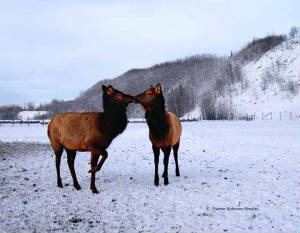 |
||
|
THE SMOKING POET |
||
|
|
||||
|
Murray Shugars Into the White Snow fell on the city like a language we
didn’t speak. We stood alone on a
bridge watching ice knuckle
the pylons. This life is bound
to happen, she said, and I don’t want
to know your name. This life is bound
to happen, and there’s a
hole, a hole, a white hole in heaven. She said. She saw singed feathers falling from heaven. She said God’s
an angry father who won’t keep. He won’t keep
his hands. He won’t keep
his hands to himself. She caught snowflakes
on her tongue and in her upturned
palms. She was praying. Her hands were folded
wings. God’s a handsome
debaser, she said. He debases the finest
nights with his grin. This life is bound
to happen, and this monkey’s
gone to heaven. Joannie
Kervran Stangeland Sack of Prayers This body becomes
a metronome, slow two-step,
weight raised to lento, adagio.
Old strings sigh under the
long bow, an epiphany drawn
taut. This, my body,
redraws its lines, hungers for layers and phrases,
fragmented like Picasso’s
women fractured across
canvas, love and not
love. This is my body,
a sack of prayers sketched and
bandaged, anthems of phantom
wounds. Lacking the amnesty
of sleep, my mouth shapes
words in the thickening
dark. š Pennies Coins pile up
on the counter along with rubber
bands from the daily
paper she doesn’t read. She doesn’t
need to write another list, buy a new map,
its edges neatly creased and the highways
tangling red or blue,
the towns in different sizes of type, the
big city bold—a bull’s eye with a snarl
of roads— or a small dot
with a thin name, a few stores,
and fields rolling between the occasional
silo or water tower.
She has a drawer full of travel plans—some
old and folded all wrong, others
barely opened. No, she doesn’t
need another set of instructions. Just one good
compass point. She would pay
for that. š The Spine’s
Minor Betrayals Limbs move in
a chorus of pain— short solos,
subtle crescendos, a muscular music,
a twinge like a string
around her finger, too tight. What did she
forget? The symphony
comes and plays while autumn
falls, notes from a staff, arpeggios descending
into darkness, the lesser known
modes: Phrygian, Doric. A descant
of dry leaves clatters staccato in the
road. Remember, cold sings into
her bones, another skeletal
song. Like the fugue, the aching grace
of the familiar. Ivy
Page On My Way There This frayed edge
on the soft of my lips comes off as disgust and
distaste. It’s only the wind beating the edges
of this body. My father’s
eyes stare back at me in the mirror. That drop to
the corner is a slow train to where I have
been. Baked with sarcasm,
I bleed poetry, I cry a song,
and I love a man with a face ten
years too young. Shelby
Stephenson PD Couplets When Aunt Edna
mashed the grease out of me I sprang from
the pan to see How I was not
forewarned− BH had shot me
in my groin And his “possum
dog” sunk his teeth Deep into my
side−so deep In fact I felt
crucified: Jesus, I knew: I prayed, saying
What have I done to be so blue? Do not fail me
now, Lord; may I rise From this splattering
skillet to a size Neither shortening
nor lard, tubfuls, even− Hot−I mean,
can melt or cause me to fall from the Crown of Stephen, Though I operate
peripheries−what can I do? Some Might leave me
for dead in popping oil, my race run, My basic wildlife
a deadend for any hope toward release. Well, I’ve
got news for Rescue Services everywhere−cease Worriment: here are some real hot tips For those whose
hearts are heavy with remorse, lips Dry from treating
Little Feet rudely: Feel distressed
for what you have done, truly? To one whose
ancestors have been around for 60 million years, Since the days
of the dinosaurs! Go on, rain tears Over us as we
travel alone night after night in search of food, Eating just about
everything: worms, frogs, grass, corn:
why, once I stood On a garbage-can
in a backyard in the South and ate some grits From Aunt Edna’s
share of Sunday dinner: they gave me the running shits But I got over
that and returned the next evening for some leftover dog food. The night was
dark, quiet: I saw her in the window from a pile of wood. She looked forlorn,
standing in her widow’s frame, pulling down the Venetian blind. I wanted to claim
her crowded suburb for my own, find Out if I could
beat the most dangerous enemy opossums have ever had. Oh what cruelty
Man brings to territoriality: cars, guns, traps, bad Poisons−what
redundancy!−I mean to make you listen: We opossums are
clean, non-aggressive, non-destructive−bootyfools!−we glisten When we grin,
on our backs−what a sight: we carry our babies! Immune to most
diseases, we are not likely to carry rabies. Quiet, reclusive,
politic, beneficial to the environment because we eat insects: Not only that,
I, born Little Feet, help the poet come up with anapests. Like Australia’s
kangaroo and koala The opossum is
North America’s only marsupial. Am I making my
case? If you find a newborn babe You will probably
find a roadkilled mom: save That infant,
for the little one fell off the mother’s back or out of her pouch. You do not have
to wait and watch forever: take the ouch Out of the baby’s
life by warming it in your hands (wear gloves) And place it
in a box on top of a towel-wrapped hot water bottle: love’s Sweet song will
honor you, as your baby opossum sleeps The time away
in the semi-dark you have made: feed- Time will come
soon enough: remember: quiet is
the watchword for little ones: Newborn opossums
are about the size of kidney beans. ~~~~~~~~~~~~~~~~~~~~~~~~~~~~~~~~~~~~~~~~~~~ Shelby Stephenson’s Family Matters: Homage to July, the Slave Girl received the Bellday Prize for Poetry in 2008,
Allen Grossman, judge, and the Oscar Arnold Young Award, 2009, Jared Carter, judge. ~~~~~~~~~~~~~~~~~~~~~~~~~~~~~~~~~~~~~~~~~~~ Scot
Siegel Skeleton Says stay up all
night don’t
drink any water fall asleep
in a de-hydrator go snowshoeing
in a storm follow the
wrong star home crawl on all
fours hunker down
beside the wildfire drink a little
too much cabernet glissade the
saddle of your lover’s nylons scratch the
doorframe let your tongue
sail the honeyed room unhinge her
jaw feel her marrow
move Luke Morgan The
Model Ship Sails
drape from a gaunt structure. I
now watch as these skins of my childhood are bathed in flames,
And curl in retreat, burning. Memories
drift from its main mast, “The
big bone” as we called it, And
seep from the bowsprit, Jutting
like death above the waterline. …I
see my father with pride in his eyes As
he held it. I see my plaque also, that Glossy
wooden mantle with a golden crown; An
epitaph of victory, engraved on its sheen… But
I now watch as waves lick this deck, A
tempest of cries blaring from clinkered shaft – “Abandon
ship, crew! Quarterdeck down to nought!”
And hopeless, I watch it sink In
cackling fire, never moving, Having
never seen the sea. š Bloodshot Blackberry
Imagine the nonsense scream Of the red
blackberry between my palms. Imagine
the juicy crimson liquid Crawling
its way to my wrist – sticky and itchy.
Just think of the flesh inside, the clumps Of moist
red meat, a sign of false ripeness. Don’t
you desire imagination, my friend? Can’t
you see why Mother Nature’s blood is on my hands? Luke Morgan
has loved poetry from a very young age—he is now 15 years old. Together with his English teacher, himself an established
poet, he works at improving his writing ability with pleasure. He attends St. Edna’s College in Co. Galway, Ireland,
and other than poetry, his interests include rugby, music and art. Mick
Parsons We Happy Few We’ve got everything
we need: pretty plastic and bright
lights to cover our imperfections. Flashy bleached smiles pre-packaged feminine wiles and manhood in a pill. Elsewhere, in pockets, hidden deep in forgotten mountains, there are others singing new songs, writing new epic poetry, and eating honey right off the comb.
We buy ours in quaint jars stacked on riveted shelves in organic markets and let ourselves feel better about our more natural kind of life. Mick is the
author of two collections of poetry; his work has been featured on semantikon.com. His work has been published in The
Licking River Review and the American Mythville Review. Mick currently resides in Tempe, Arizona with his wife
Melissa and their two cats, Blue and Gumbo. When he isn’t writing, he might be found in any number of local bars or coffee
shops, at off-track betting sites, or at the track. He might need a haircut. |
||||
|
Feedback, submissions, ideas? E-mail thesmokingpoet@gmail.com |
||||
